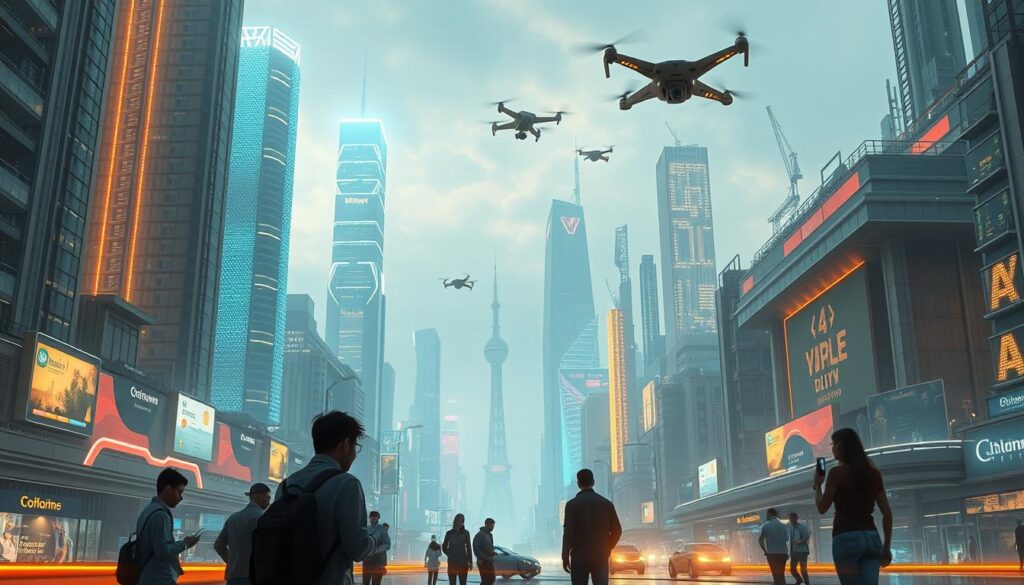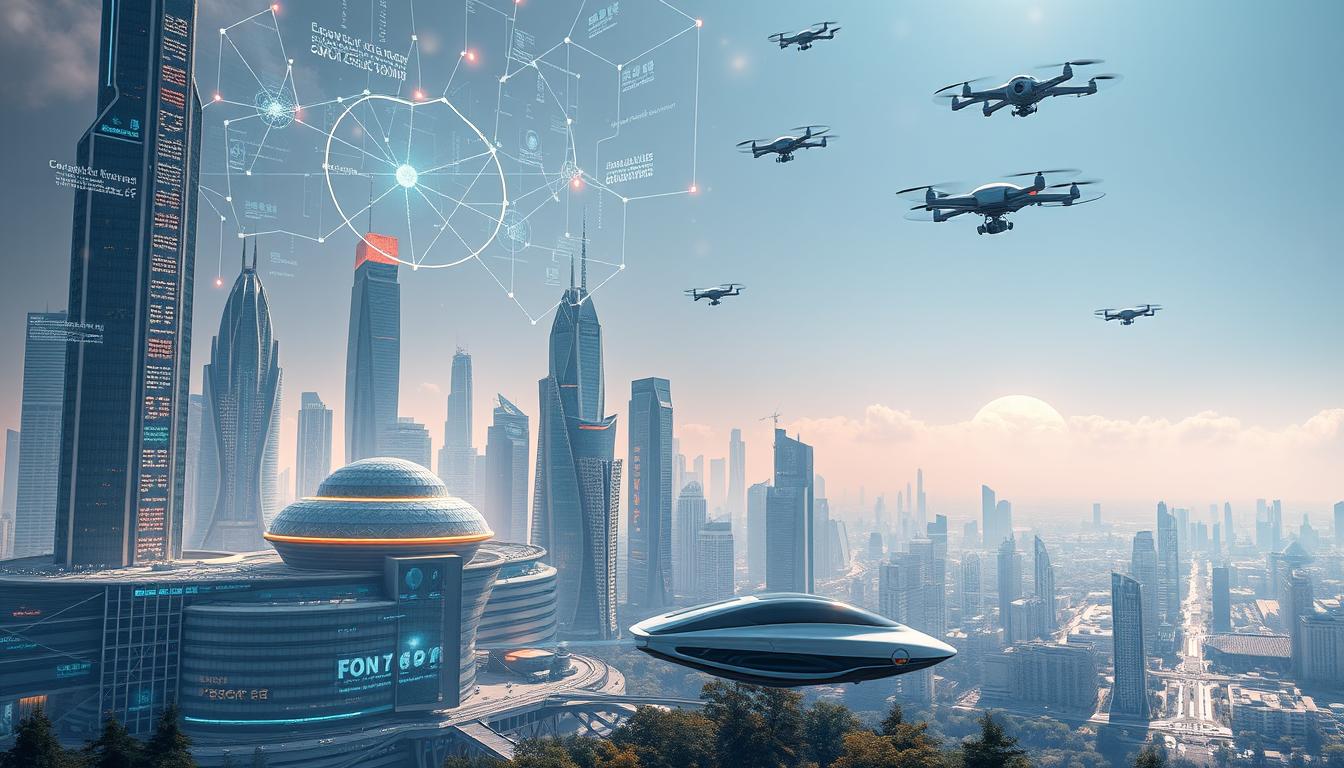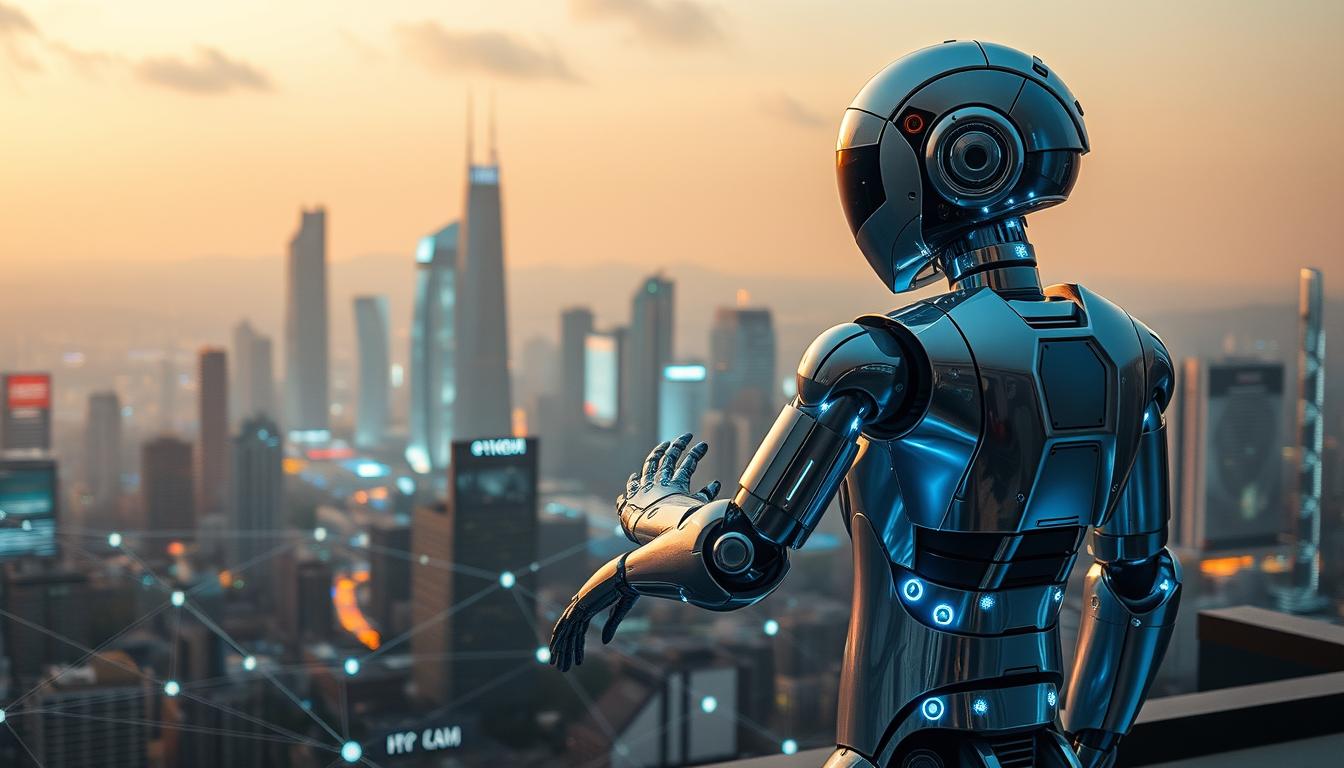What if everything you think you know about tomorrow’s innovations is already outdated? By 2050, the world could look radically different thanks to breakthroughs. These advancements will blur the lines between science fiction and reality. Experts predict a future where technology redefines how we live, work, and connect.
Imagine waking up in a home that knows exactly what you need. Vehicles that drive themselves and medical treatments tailored to your DNA are within reach. Leading researchers see a future with quantum computing, neural interfaces, and climate-resilient infrastructure. But, big questions arise: How will society adapt to these changes? Who gets left behind?
This isn’t just about new gadgets. It’s about a fundamental shift in humanity’s relationship with innovation. Companies like Google and IBM are working on systems that could outpace today’s fastest supercomputers. Meanwhile, debates over AI governance and data privacy are heating up. The next three decades will test our ability to use these new tools wisely.
Key Takeaways
- AI integration will reshape daily life, from personalized healthcare to automated urban systems
- Quantum computing breakthroughs could solve problems currently deemed impossible
- Human-machine collaboration may become as common as smartphone use today
- Climate tech innovations will dominate infrastructure development
- Ethical frameworks for emerging technologies remain a critical global challenge
- Energy storage solutions could make fossil fuels obsolete by mid-century
The Future of Artificial Intelligence in 2050
By 2050, artificial intelligence will change how we use technology. It will mix human creativity with machine precision. Self-improving algorithms and learning systems will lead to new discoveries in many fields.
This change will bring both benefits and challenges. We need to solve issues like ethics and job changes quickly.
AI Advancements That Will Transform Industries
Healthcare diagnostics will use AI to predict diseases early. For example, IBM’s Project Debater can analyze medical papers much faster than humans. AI drones will also check crop health, improving yields in dry areas.
Three major breakthroughs will shape the future:
- Self-repairing robots will cut down on factory downtime
- AI will create crops that resist climate changes
- Non-programmers will be able to make apps with voice-to-code platforms
Ethical Considerations in AI Development
Recent tech trend analyses highlight the need for rules on AI weapons. By 2040, AI might replace many manufacturing jobs, leading to a need for:
| Challenge | Current Approach | 2050 Solution |
|---|---|---|
| Data Privacy | Encryption protocols | Self-destructing data particles |
| Algorithm Bias | Diversity audits | Real-time morality circuits |
| Job Displacement | Retraining programs | AI partnership certifications |
Experts at DataLeon stress the importance of “ethical by design” AI. These systems will flag biased decisions instantly, ensuring fairness without slowing down.
The Rise of Smart Cities and Infrastructure
Urban landscapes are changing fast as innovative tech in the future meets city planning. By 2050, cities will be like living ecosystems. They will use sensors, green energy, and AI to work together smoothly.
This change will tackle big issues like crowded cities and climate change. It will also make life better for everyone.
Integration of IoT Devices in Urban Planning
Today’s cities use IoT networks to improve traffic and emergency services. Singapore’s Smart Nation shows how it works:
- Adaptive traffic lights reduce congestion by 40% during busy times
- AI-powered waste bins signal when they need to be emptied
- 5G water sensors find leaks in just 15 seconds
| Traditional Infrastructure | Smart City Solution | Efficiency Gain |
|---|---|---|
| Fixed traffic light cycles | AI-adjusted signal timing | 32% faster commute times |
| Manual utility monitoring | Automated IoT sensors | 67% faster issue detection |
| Reactive emergency services | Predictive analytics systems | 28% quicker response rates |
“Cities with IoT networks have 55% fewer infrastructure failures than old cities.”
Sustainable Solutions for Urban Environments
New materials are being made that can even help fight climate change. These upcoming tech breakthroughs include:
- Self-healing concrete cuts maintenance costs by 60%
- Algae-based insulation lowers building emissions by 45%
- Solar pavement can generate 15% of a city’s energy
Our look at 5G, AI, and IoT shows how they work together for a greener future. Phoenix tested “cool pavement” coatings that cool the surface by 12°F. This is a big step in fighting heatwaves.
“By mixing new materials with smart grids, cities could be carbon positive by 2040.”
Evolution of Personal Technology and Gadgets
By 2050, our tech will go beyond today’s smartphones. It will blend with our bodies and how we see the world. Wearables and augmented reality will change how we use data and interact with our surroundings. This could make life easier but also raise big questions about privacy and how dependent we become on technology.

The Role of Wearables in Daily Life
Future wearables will do more than just track our fitness. They will act as biometric guardians, watching over our brain health and spotting health problems early. Imagine contact lenses that check your blood sugar or rings that warn of Parkinson’s disease. Some key advancements include:
- Real-time hydration analysis through sweat sensors
- EEG-equipped headbands optimizing mental focus
- Self-charging batteries powered by body heat
But, collecting all this data raises important questions. As AI studies show, we must find a balance between health benefits and keeping our personal data safe.
Augmented Reality: A Game-Changer for Entertainment
Augmented reality will soon replace smartphones as our main way to interact with digital content. Devices like Microsoft’s HoloLens 3 could turn AR contact lenses into tools for navigation, language translation, and interactive games. These lenses will offer:
- Photorealistic holograms that look real
- Context-aware filters that change based on our mood
- Multi-sensory feedback (temperature, scent, texture)
Entertainment will get a huge boost from this tech. Imagine concerts with digital dragons flying overhead or historical events coming to life in your home. But, as virtual reality in 2050 becomes more common, it might be hard to tell what’s real and what’s not.
The Impact of Quantum Computing
Quantum computing is set to change the world by 2050. It can solve problems that old computers can’t. This means big advances in fields like climate science, material design, and encryption.
Revolutionizing Data Processing and Security
Google Quantum AI is showing how quantum computers can improve battery life and carbon capture. A study found quantum tech could cut CO2 emissions by 7 gigatons a year by 2035. It could also make solar cells more efficient.
In security, quantum computers are key to new encryption methods. Old encryption methods won’t work anymore.
Potential Challenges and Limitations in Implementation
But, there are big technical hurdles like keeping qubits stable and correcting errors. IBM and Rigetti Computing are working on new quantum systems to solve these problems. There’s also a race to protect against new decryption threats.
The cost of quantum systems might slow down their use in poorer countries. As we move towards 2050, quantum computing’s success depends on teamwork and clear rules. It’s a chance to make a big difference, but only if we handle it right.
FAQ
How will artificial intelligence transform industries by 2050?
By 2050, AI will have self-improving algorithms that change many sectors. For example, healthcare and farming will see big improvements. IBM’s Project Debater is a start towards AI making decisions fast for businesses.
AI will automate 60-70% of quality checks in manufacturing. But, it will also create new jobs in AI ethics and oversight.
What sustainable solutions will smart cities implement through IoT networks?
Cities like Singapore are working on 5G-enabled IoT ecosystems for 2050. These systems will manage traffic, waste, and buildings in a green way. They will also balance energy and use materials that absorb CO2.
How will augmented reality devices evolve for consumer use by mid-century?
Microsoft’s HoloLens 3 shows us photorealistic AR contact lenses might replace phones. They will show us data and health info right in our sight. But, we’ll need to worry about privacy as these devices track us all the time.
What practical applications will quantum computing enable by 2050?
Google’s Quantum AI lab says quantum computers will speed up finding new medicines and climate modeling. But, using them will take time due to technical hurdles. They will first help in cryptography and making new materials.
How will workforce dynamics change with advanced automation technologies?
AI and robots might take 30-40% of jobs, but new fields will open up. Quantum programming, neurointerface design, and urban climate engineering are examples. Companies like Tesla and Siemens are teaching workers to work with AI, not just replace it.
What security risks accompany quantum computing advancements?
Quantum computers could break current encryption by 2045, says NIST. We’ll need quantum-resistant cryptography to stay safe. Companies like Cloudflare are already testing new encryption methods for the quantum era.





